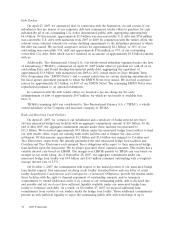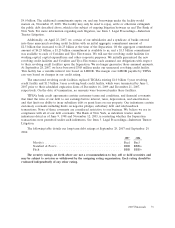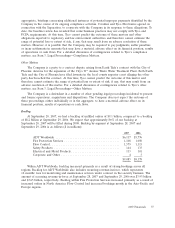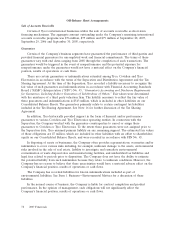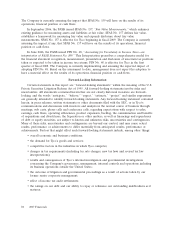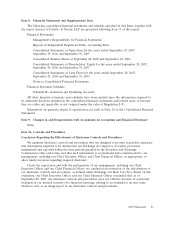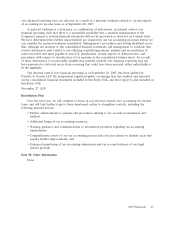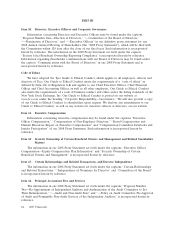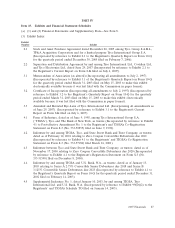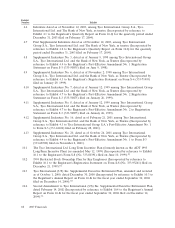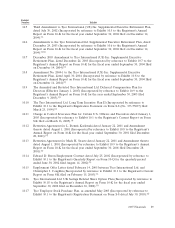ADT 2007 Annual Report Download - page 174
Download and view the complete annual report
Please find page 174 of the 2007 ADT annual report below. You can navigate through the pages in the report by either clicking on the pages listed below, or by using the keyword search tool below to find specific information within the annual report.Foreign Currency Exposures
We economically hedge our exposure to fluctuations in exchange rates through the use of forward
foreign exchange contracts and options. During 2007, our largest exposures to foreign exchange rates
existed primarily with the British Pound, Euro, Brazilian Real, Australian Dollar and Canadian Dollar
against the U.S. Dollar. The market risk related to the forward foreign exchange contracts is measured
by estimating the potential impact of a 10% change in the value of the U.S. Dollar relative to the local
currency exchange rates. The rates used to perform this analysis were based on the market rates in
effect on September 28, 2007. A 10% appreciation of the U.S. dollar relative to the local currency
exchange rates would result in a $248 million net increase in the fair value of the contracts. Conversely,
a 10% depreciation of the U.S. dollar relative to the local currency exchange rates would result in a
$303 million net decrease in the fair value of the contracts. However, gains or losses on these derivative
instruments are economically offset by the gains or losses on the underlying transactions.
Previously, we hedged our investment in certain foreign operations. In December 2006, due to
required changes to the legal entity structure to facilitate the Separation, the Company determined that
it will no longer consider certain intercompany foreign currency transactions to be long-term
investments. As a result, the related foreign currency transaction gains and losses on such investments
were recorded in the income statement subsequent to this determination rather than to the currency
translation component of shareholders’ equity. Forward contracts that were previously designated as
hedges of these net investments continued to be used to manage this exposure but were no longer
designated as net investment hedges.
Also in connection with the Separation and the debt tender, the Company de-designated its
6.125% Euro denominated public notes due 2007 on March 29, 2007, its 5.5% Euro denominated
public notes due 2008 and its 6.5% British Pound denominated public notes due 2031 on May 21, 2007,
that had previously been considered as hedges of net investments in certain foreign operations. At
September 28, 2007, the Company did not hedge its net investment in foreign operations, and all of its
outstanding borrowings were denominated in U.S. dollars.
Interest Rate Exposures
Our long-term debt portfolio primarily consists of fixed-rate instruments. Historically, the Company
managed its exposure to interest rates by entering into interest rate and cross-currency swaps
designated as fair value hedges. In assessing the potential risks related to movements in interest rates,
we terminated the interest rate and cross-currency swaps in several tranches beginning in the fourth
quarter of 2006. During the first quarter of 2007, we terminated the remaining contracts with a total
notional amount of $0.6 billion, resulting in an aggregate terminated notional amount of $3.1 billion.
The settlement of these swaps resulted in a net cash inflow of $63 million for the first quarter of 2007.
Since the interest rate swaps were designated as hedging instruments of outstanding debt, the related
$32 million loss adjustment to the carrying value of the related debt will be amortized over the
remaining life of the related debt instruments. In connection with the debt tender offer, $9 million of
unamortized loss on interest rate swaps was accelerated and recorded as a loss on retirement of debt
and included in other expense, net (see Note 13). At September 28, 2007 there were no interest rate
swaps outstanding.
Commodity Exposures
We are exposed to volatility in the prices of raw materials used in some of our products and may,
in limited circumstances, enter into hedging contracts to manage those exposures. These exposures are
monitored as an integral part of our risk management program. At September 28, 2007, the Company
did not hedge its exposure attributable to changes in commodity prices but may consider such strategies
in the future.
82 2007 Financials


